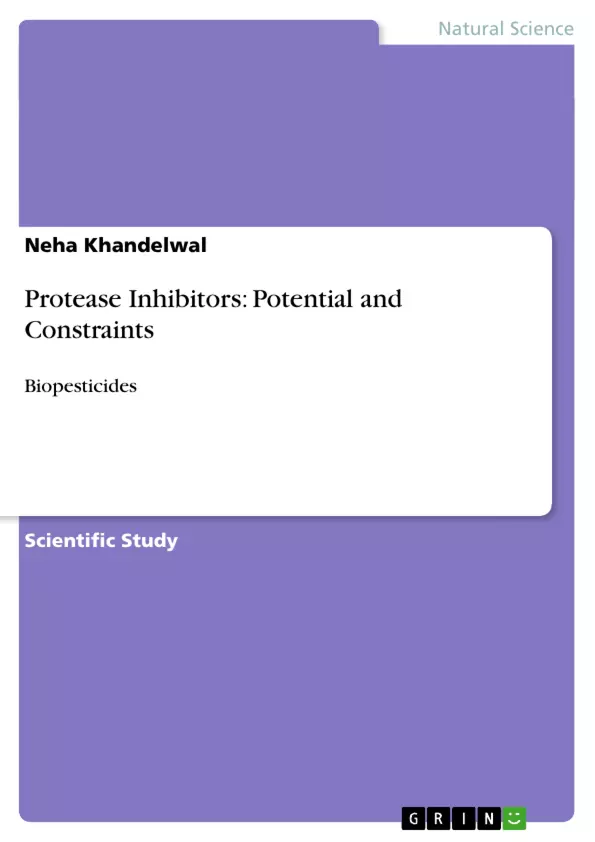This book chapter covers the previous and current research on plant protease inhibitors being conducted worldwide since its identification. Plant protease inhibitors exists as natural defense mechanism in plants. Solanaceous plants have highly been explored for the protease inhibitor expression and function against various insects of the order lepidoptera, coleoptera, diptera and many more. Plant protease inhibitors are the well studied class of plant defensive proteins. High level of up-regulation upon insect damage, significantly elevated levels in reproductive and storage organs as well as specificity to pest proteases ascertain their defensive function. In the present chapter, we introduced molecular basis of plant-insect interactions and focused on different classes of protease inhibitors based on their target protease(s).
Inhaltsverzeichnis (Table of Contents)
- Insect pests: A major challenge in sustainable agriculture
- Plant-insect interaction
- A. Monophagous or specialized pests
- B. Oligophagous pests
- C. Polyphagous or generalized pests
Zielsetzung und Themenschwerpunkte (Objectives and Key Themes)
This chapter provides a comprehensive overview of protease inhibitors as biopesticides, exploring their potential and limitations. It examines the molecular basis of plant-insect interactions and focuses on different classes of protease inhibitors, particularly serine protease inhibitors. The chapter investigates the use of Pin-I and Pin-II type protease inhibitors for insect control, highlighting their unique features and potential applications. The chapter also addresses challenges and unanswered questions regarding the use of protease inhibitors in pest management, emphasizing the need for further research and development.- Molecular basis of plant-insect interactions
- Different classes of protease inhibitors
- Potential of Pin-I and Pin-II type protease inhibitors for insect control
- Challenges and limitations of using protease inhibitors as biopesticides
- Future directions for research and development
Zusammenfassung der Kapitel (Chapter Summaries)
- Insect pests: A major challenge in sustainable agriculture: This section introduces the significance of agriculture in India and the challenges posed by insect pests. It highlights the heavy reliance on chemical pesticides and the detrimental effects on human health and the environment. The section emphasizes the need for sustainable agricultural practices and explores alternative pest control methods.
- Plant-insect interaction: This section delves into the complex interactions between plants and insects, focusing on the feeding habits of different insect categories: monophagous, oligophagous, and polyphagous. It provides examples of each category and discusses their impact on agriculture. The section also examines the adaptability of polyphagous insects to diverse host plants and their ability to alter their digestive systems to metabolize various plant components.
Schlüsselwörter (Keywords)
The key focus of this chapter is on the potential of protease inhibitors as biopesticides to combat insect pests in agriculture. The text discusses the molecular mechanisms underlying plant-insect interactions and explores different classes of protease inhibitors, particularly serine protease inhibitors. The chapter emphasizes the potential of Pin-I and Pin-II type protease inhibitors for insect control and highlights their unique features and applications. The key themes include biopesticides, lepidopteran insects, protease inhibitors, transgenic plants, sustainable agriculture, and insect pest management.Frequently Asked Questions
What are plant protease inhibitors?
They are natural defensive proteins in plants that inhibit the digestive enzymes of insects, serving as a biological defense mechanism.
Can protease inhibitors be used as biopesticides?
Yes, by expressing these inhibitors in transgenic plants, researchers aim to create crops that are naturally resistant to pests like lepidopterans and coleopterans.
What is the difference between Pin-I and Pin-II type inhibitors?
These are specific classes of inhibitors (often found in Solanaceous plants) with unique molecular structures tailored to target different pest proteases.
What are the challenges of using protease inhibitors in agriculture?
Challenges include insects developing resistance by up-regulating different classes of proteases that are not affected by the inhibitors.
Why is sustainable pest management necessary?
To reduce reliance on chemical pesticides, which have detrimental effects on human health and the environment, and to combat the adaptability of polyphagous pests.
- Citation du texte
- Neha Khandelwal (Auteur), 2011, Protease Inhibitors: Potential and Constraints, Munich, GRIN Verlag, https://www.grin.com/document/209929



